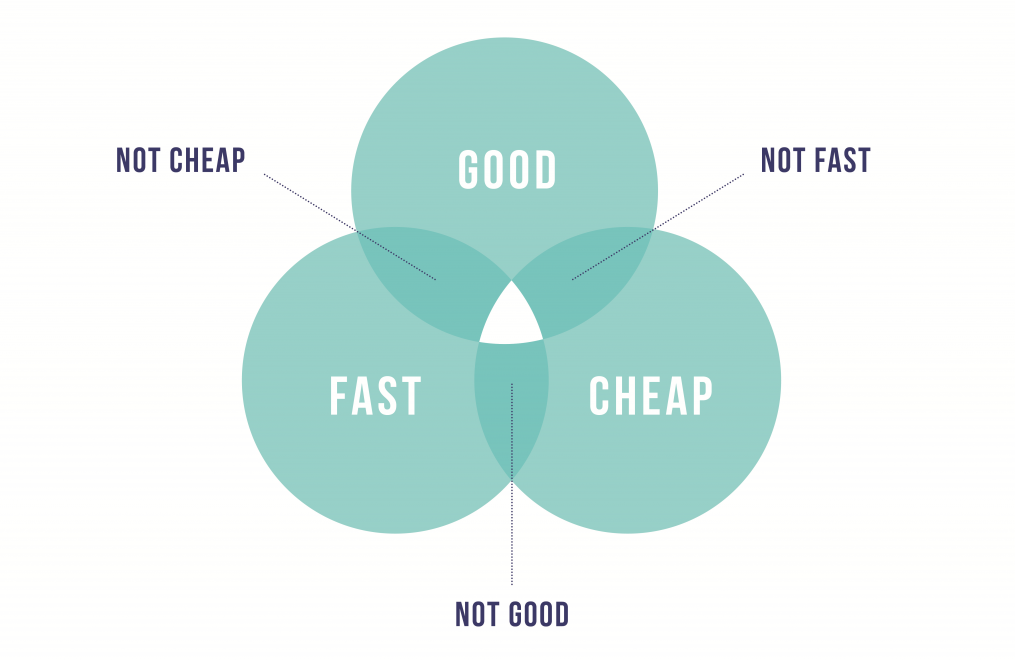Step-by-Step Guide to Working with a Video Production Company
December 13, 2019·10 min read
They key to great outsourced videos is a strong relationship between you and your video production company. Follow these steps and you'll be on your way to great video content.
There are many ways to produce a video. You can do it yourself, you can hire an in-house video team, and sometimes, you call in the big guns.
Video production companies (a.k.a. video production agencies) exist to make videos for companies like yours. They are experts at what they do, and if you haven’t used one yet—here’s why you might want to and how to do it effectively.
Why Should You Hire a Video Production Company?
Sometimes it’s hard to decide when to make a video in-house and when to outsource. At Vidyard, we’re always talking about how easy it is to make videos in-house, even with nothing more than a smartphone—and we stand by that.
That said, there are some cases when you might want to collaborate with an outside agency and the capable hands that come with a production company.
When Your In-House Team is Swamped
It happens! If you’ve fully adopted video as your medium of choice, you’re probably already using it throughout your business. All those videos add up.
There will be busy times in the year when your video team is at capacity and you might want to consider calling in a production company to pick up the slack.

When You Need an Outside Perspective
Have you ever heard of being too close to your own work? In-house teams are a natural fit for things like demo videos that highlight product-specific subject matter. On the other hand, wide-reaching videos like explainers and promos could benefit from an outsider’s perspective.
A production agency that has to learn about your product may be able to more easily put themselves in the shoes of your audience. Harness that newness and work together to make sure it’s accurate.
The agency team really didn’t know the first thing about Uberflip or what it means to be a content experience platform. They were able to harness that fresh perspective and work together with Uberflip to make an entertaining and relatable series, that was still in line with the vision of the brand.
Find out what a dungeon master has to do with content experience in this episode of the Video in Focus Podcast that goes behind-the scenes on production of the unique explainer.
When You Want a Little More Pizazz
Video production agencies eat, sleep, and breathe video. They have the equipment, the experience, and the access to niche professionals to help you with things like special effects, animation, and cinematography. And while an in-house team can be great at wearing all the hats, sometimes it’s worth it to go big.
Watch our take on a holiday party filled with characters from classic holiday movies. You can personalize this video for your own friends and coworkers so that their name appears alongside Clark Griswold and John McClane.

9 Tips for Working With a Video Production Company
If you’ve decided to hire an outside video production company, here are some important things to keep in mind as you work on your next great project.
Think of your agency and core team of employees as one team. A truly balanced workforce will include agencies, freelancers, and employees working in harmony. It isn’t easy—but it is magical when you get it right.
Derek RiderMedia One Creative and Media One GroupCEO and Co-Founder
1. Define the Purpose of Your Video
Let’s start with the basics: Why are you making this video? This is the most important piece of information to communicate to a production company.
- Who is your target audience? Are they people who already know about your brand or is this the introduction?
- What is your call to action? Intending to drive sign-ups vs. generating brand awareness can affect the creative direction of the video.
- Where will this video live? A video for a landing page might be very different from one on social media.
2. Know Your Tone
Strong emotions elicit strong reactions. That being said, no one knows your audience better than you do, so picking the right way to convey that emotion is key.
For example, let’s say you want viewers to come away from your promo video with a feeling of trust. If your audience is a start-up community, you might want to go for a friendly and personal tone where viewers hear from real employees. If your audience is more corporate, you might want to stick with a more formal tone while leaning on facts and company history.
It can also be helpful to provide the production company with examples of videos that you like. A good production company will walk you through the process of finding the right tone, but being explicit eliminates any room for misunderstanding.
3. Find the Right Video Production Partner
Now that you know what kind of video you want to make, it’s time to find a production company to match. Do some research and be sure to review their portfolios and demo reels. Get recommendations from peers you trust and set up some meetings.
Share your own creative vision as defined by tips one and two. This might take the form of a creative brief where you spell it all out in writing. You might take pitches based on your initial concept to see if your instincts match.
CEO and co-founder of Media One Creative, Derek Rider, suggests evaluating the skill set of each agency to find a set that complements your own. He calls it the “skill set Venn diagram.”
Ideally, the agency you hire will have strong skills where you lack and vice versa. Hiring an agency with similar skill sets to that of your own in-house team will run the risk of overlap and leaving gaps.
So for example, if your team has an amazing animator on staff, opt for an agency with great writers who can work with you to create something awesome.
4. Share Your Vision Early in the Process
Now that you have your team, it’s time to start working like one. Sit down together (or have a video chat) for an exploratory meeting in which you’ll go over the details of your awesome project.
This is when you’ll hear a more in-depth creative vision from your production company and have the opportunity to course-correct and provide your own brand standards including design elements like font and colors.
Besides the creative, you’ll also share key performance indicators so that everyone can be aligned on the ultimate goals of the project early on.
At this stage, the most important thing is to be open to new ideas while also being honest about your expectations and who you are as a brand.
5. Define the Scope of Your Project
Let’s get one thing straight—what do you expect to get from your production company? Different companies offer different services from conception and scripting through post-production. Will you require additional assets like a shorter cut of the video to use on social? Many agencies will offer all of the above, while others offer services a la carte.
Terry Nelson, founder and director at production company Innertainment, says, “Gone are the days of the ‘one and done,” (one annual video project that eats up the entire budget). “Advances in tech have made video more affordable to produce and the results of that video’s performance is now easier to track. Take advantage.”
After sharing our vision and examples of videos we loved, Innertainment got back to us with their proposal—a simple, but aesthetically pleasing motion graphic video. We liked it so much that we’ve gone back to Innertainment to request other videos in a similar style.

The sky’s the limit when it comes to video. Just make sure you identify how high you want to fly before taking off. Much of the scope will depend on the next tip: Budget.
6. Know Your Video Production Budget—and its Limitations
“What’s the budget” is going to be one of the first questions you’ll be asked by a production company. They need to know what they’re working with in order to give you an accurate picture of what they can accomplish.
When setting a budget, keep in mind the triple constraint theory which is a project management theory that says while it’s ideal to balance quality, speed, and cost, any change to one of these elements will affect the other two. So, for example, if the deadline is coming up fast, you won’t be able to maintain a high quality without spending more money. On the other hand, if you’ve got a shoestring budget, it’s harder to make something high quality, especially under time constraints. So the saying goes, fast, cheap, good—pick two. Set your priorities before finalizing your budget.

Image via Moonlight Creative.
7. Set a Video Production Timeline
The producer will set the production schedule by working backward from the date you need the video delivered. Production companies can have a lot of projects on the go and your team probably does too, so nailing down shoot dates and delivery timelines in writing, in advance is key. Be sure to also include dates for your team to respond to feedback.
This gives everyone clear expectations from the start. The schedule might change along the way, but at least you’ll have something to aim for.
8. Be Open to New Ideas
You’re working with a production company for a reason. Although fresh eyes might mean some initial work translating details about your product or brand, your brand can benefit greatly from an outsider’s opinion. This might be the perfect opportunity to shake things up, pivot your strategy, or fill in knowledge gaps.
At Innertainment, Terry always tries to avoid “stale” and “safe,” and working to “permanently eliminate the stigma that corporate video is boring.” With the audience as their first priority, Terry’s favorite customers are the ones who come prepared to make “unique and engaging videos.” And isn’t that what we should all be aiming for?
9. Communication is Key
You’ll be asked for feedback at various stages through pre-production, production, and post-production. As a client, the best thing you can do is be responsive. A lack of response can hold up the delivery of your video.
So, even if you need time to gather approvals from the appropriate people, keep the lines of communication open and try to give hard dates to your own team for feedback when possible.
Working with a production company is a relationship game. You can hire the most talented team in the biz, but if you don’t keep up good communication, you might be unpleasantly surprised by the results.
Strong Relationships Build the Best Videos
Like any good relationship, this one will require communication, trust, and mutual respect.
Trust each other to bring something unique to the table. The production company will bring expertise and an outside eye. Your company will bring brand knowledge and vision.
As Rider says, “Every agency is different—but at Media One Creative, we believe in what we like to call ‘co-creation’.” As you communicate openly, you will align with your production company, and your relationship will strengthen over time. Ideally, you’ll find a production company you can work with more than once and as you get to know one another, each project will become easier than the last.



